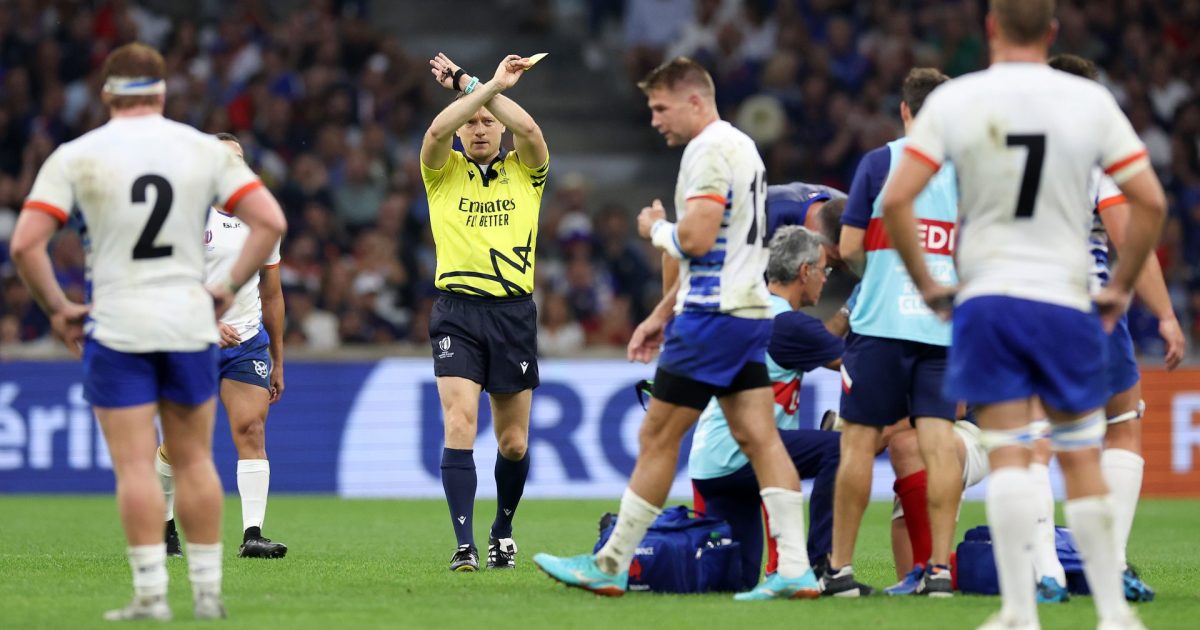Au final, cinq matchs de suspension pour le Namibien Johan Deysel

La Coupe du monde du capitaine de la Namibie, Johan Deysel, est terminée. Le centre a été condamné à cinq semaines de suspension pour son plaquage dangereux sur le capitaine de l’équipe de France, Antoine Dupont, jeudi 21 septembre.
Deysel a été reconnu coupable d’avoir causé une fracture de la pommette de Dupont lors d’un choc en seconde période à Marseille, ce qui a entraîné un carton rouge pour le Namibien.
À l’issue d’une audience devant une commission de discipline indépendante, où le joueur de 32 ans a été accusé d’avoir enfreint la règle 9.13, il a été exclu pour douze semaines. En raison de ses bons antécédents disciplinaires et de ses excuses, la sanction a été réduite de moitié et une semaine supplémentaire lui sera retirée s’il participe au Programme de Soutien aux Entraîneurs de World Rugby.
Comme la Namibie n’a plus qu’un seul match à disputer, contre l’Uruguay, et qu’elle ne peut pas se qualifier pour les phases à élimination directe de la Coupe du monde, l’exclusion met fin au tournoi de l’ancien joueur de Colomiers.
Déclaration intégrale de World Rugby
Le Namibien Johan Deysel a été entendu par une Commission disciplinaire indépendante pour une infraction à la loi 9.13 (plaquage dangereux) à la suite de l’examen effectué par l’Officiel en charge de la Révision du jeu déloyal (FPRO) lors du match de la Poule A de la Coupe du Monde de Rugby 2023 contre la France, le 21 septembre.
La Commission de discipline indépendante était présidée par Adam Casselden SC (Australie), assisté des anciens arbitres internationaux Donal Courtney (Irlande) et Juan Pablo Spirandelli (Argentine).
Le joueur a reconnu sa faute, et que celle-ci méritait un carton rouge.
Après avoir examiné toutes les preuves disponibles, les observations du joueur et de son représentant, la Commission indépendante a considéré que l’acte de jeu déloyal se situait au plus haut degré de gravité dans l’échelle des infractions, compte tenu du degré d’imprudence de la faute, de la vulnérabilité du joueur victime et de la blessure importante qu’il a subie. En vertu de l’annexe 1 du règlement 17, la Commission indépendante a déterminé que la sanction minimale devait être de 12 matchs.
Circonstances atténuantes
Après avoir pris en compte les circonstances atténuantes, y compris le fait que le joueur a immédiatement reconnu la faute et la sanction, le dossier disciplinaire exemplaire du joueur et ses excuses au joueur victime de la faute, la Commission a appliqué la réduction maximale de 50 % à la sanction. La sanction finale de six matchs sera appliquée comme suit :
- Uruguay – Namibie – 27 septembre
- Calendrier des matchs à venir à déterminer*
*Le joueur a l’intention de demander à participer au programme de formation au plaquage de World Rugby afin de remplacer le dernier match de suspension prévu dans le cadre de la sanction par une intervention d’entraîneurs visant à modifier les techniques spécifiques et à régler les problèmes techniques qui ont contribué à la faute (sous réserve de réussite de l’intervention). De plus amples informations sont disponibles ici.
Le joueur dispose pour faire appel d’un délai de 48 heures après mise à disposition de la décision complète par écrit, qui apparaîtra ici une fois publiée.
Rendez-vous sur la page de World Rugby consacrée à l’éducation et à la l’information sur la procédure disciplinaire, qui comprend une vidéo sur le fonctionnement de la procédure disciplinaire dans le rugby.


